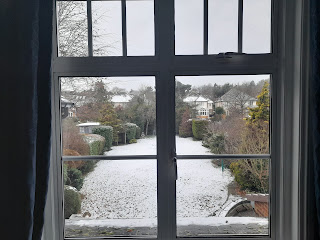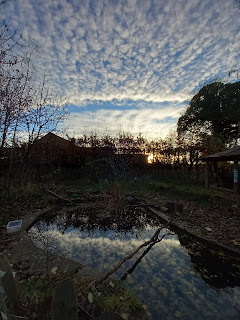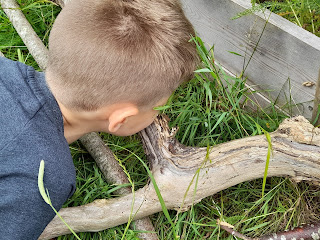Play Culture
I'm sitting in a friend's dining room with huge mug of tea. She and her family are 'night owls' and I'm definitely an 'early bird'. It's 8am and she and I got to bed about 6 hours ago after a great dinner party and an overdue catch up in her new home. So now, the house is still, I have my cuppa, and I'm silently watching her snow covered garden.
There are silent Crows and Magpies flitting up and down from grass to treetops, Sparrows performing aerobatic tumbles, and a Blackbird overturning leaves in pursuit of a sheltering bug, while Goldfinches zip past them at speed.
The snow is a messy mass of footprints, shadowy dips, and piled ridges. None of them human made. I can trace the journey the fox took from right to left along the edge of the patio and back again. I can see scurrying marks and holes the squirrels have left, and an assortment of pigeon footprints lead me to wonder if they were joining in with 'Strictly Come Dancing' last evening.
As for the fox cubs - I know exactly what they are doing, because I can see them at the end of the garden. Noses down, bottoms up, pouncing on... well, from here it looks like nothing. Now and then they pounce on each other in a puff of frost.
They tumble over each other and then chase, disappearing into the hedge. Sometimes it's a while before they come back out, sometimes they appear immediately. A portly wood pigeon wanders out, does a U-turn and waddles back under the hedge as fast as it can as the cubs bound towards it.
These are animals at play. From the birds ballet as the ride the air to the foxes prancing. It's fun to watch, it certainly looks like it's fun to do. It's essential to their survival.
Wildlife has a 'play culture' that's innate, a process of practicing and perfecting actions that will need once they lose their parents protection. The adult animals watch and even support their young, leading by example and encoraging skills. Today the cubs are learning how to hunt. The birds have learned how to move using air currents to conserve energy, but also to enjoy movement and chase through the air as squirrels chase through the trees.
Play will repeat all through their animal childhood and then continue into 'having fun' as adults, even when they have mastered these life skills.
We are no different. Play is not a leisure time activity that babies and children indulge in until they are ready to toil for wages! Play is how the human animal learns life skills too.
I hope by now everyone has come across the brilliant TED talk by seven year old Molly Wright about 'A Simple Game of Peekaboo'. Made last year it floats about the Internet extolling the benefits of interaction and playing with babies.
That need for interaction and play continues throught childhood, and if we're honest, life.
As adults we facilitate safe spaces and opportunities for children to explore the world in every sense through play. We need to observe what they do, respond to their requests, and try not to interfere with what they are discovering or devising.
Play is the best way for children to bond, with friends, siblings, and adults. It teaches teamwork and communication, and, equally, can cause arguments and upset. In which case it teaches cooperation, sharing, resilience, and a sense of fairness.
Solo play is just as powerful. A child intent on following their own train of thought, persevering at a self chosen talk, repeating action and building strong neural pathways.
Playing is learning. And the better play culture we have for children, the better learning culture we have! Through play interactions with their family, environment and community, children learn so much, skills to make life less challenging, skills to make school more accessible, but skills that the curriculums overlook.
 |
| From Michael Hall Larsen |
Children will involve all their senses in a self chosen tast, all their emotions, and attention: a truly immersive experience that it doesn't have to include a venue or tickets.
Activities inside or out don't have to have an end product, the process of splashing in puddles, climbing trees, and watching nature is as valid as an elder bead mobile, a beautiful journey stick, or a collection of Autumn Leaves. Walking away from a game or experience with empty hands doesn't mean it wasn't full of learning!
Familiarity with the environment they are in builds confidence to explore more, to take risks, to be brave and push boundaries. As long as adults are there to explain how to do these things safely, childrens confidence will grow. They are motivated to try new things and follow their own ideas. Their self esteem strengthens and they develop their own resourcefulness for coping with life and learning. They stretch their imagination and ignite their curiosity, and allows them to work through issues in their own way, as well as share their hopes and dreams, worries and fears.
Play happens at home, in the garden, in the park, and at playtimes. It needs to happen more in schools, especially in lessons throughout childhood, not just eyfs. It is a powerful tool with which to teach anything and everything, the skill is in allowing the learners to do so in their own way.
In Forest School we promote it, we encourage it, we thrive on it. Our play culture is intrinsic with a progression of skills that are guided learning opportunities children can dip in and out of. The vast majority of what they learn comes from individual investigation and discovery, this is as tailor-made as learning gets!
Since life began, play has been the tool to teach the young how to survive as adults. Somewhere along the way it was decided that nature didn't know what it doing, play became a trivial waste of time, and learning had to = toil.
Play IS development, it is learning, but too many people don't know what they are looking at and dismiss it! Last month I listed what parts of our curriculum our pupils were accessing independently while at play, and I was surprised how many people responded that they'd never seen it that way.
Nearly every parent or carer I've ever met is immersed in their own work, engaged in jobs and chores that take them away from their offspring in a bid to give their child 'the world'.
Yet when we show children the world they live in, when we teach them how to explore it, give them the skills required to care for it, and the understanding to find their space within it...
Surely we ARE giving them the world?












Comments
Post a Comment